牛津英语5B知识点总结
- 格式:doc
- 大小:98.00 KB
- 文档页数:8
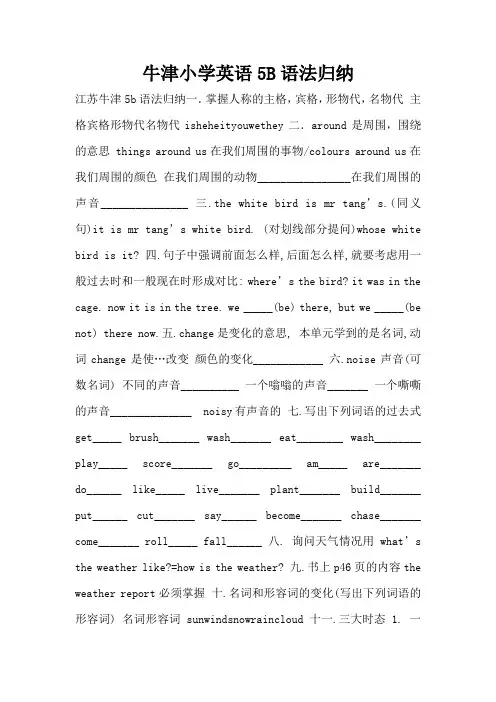
牛津小学英语5B语法归纳江苏牛津5b语法归纳一.掌握人称的主格,宾格,形物代,名物代主格宾格形物代名物代isheheityouwethey二.around是周围,围绕的意思 things around us在我们周围的事物/colours around us在我们周围的颜色在我们周围的动物________________在我们周围的声音_______________ 三.the white bird is mr tang’s.(同义句)it is mr tang’s white bird. (对划线部分提问)whose white bird is it? 四.句子中强调前面怎么样,后面怎么样,就要考虑用一般过去时和一般现在时形成对比: where’s the bird? it was in the cage. now it is in the tree. we _____(be) there, but we _____(be not) there now.五.change是变化的意思, 本单元学到的是名词,动词change是使…改变颜色的变化____________ 六.noise声音(可数名词) 不同的声音__________ 一个嗡嗡的声音_______ 一个嘶嘶的声音______________ noisy有声音的七.写出下列词语的过去式get_____ brush_______ wash_______ eat________ wash________ play_____ score_______ go_________ am_____ are_______ do______ like_____ live_______ plant_______ build_______ put______ cut_______ say______ become_______ chase_______ come_______ roll_____ fall______ 八. 询问天气情况用what’s the weather like?=how is the weather? 九.书上p46页的内容the weather report必须掌握十.名词和形容词的变化(写出下列词语的形容词) 名词形容词sunwindsnowraincloud十一.三大时态 1. 一般现在时(通常看到:usually/often/on sundays等要用一般现在时。
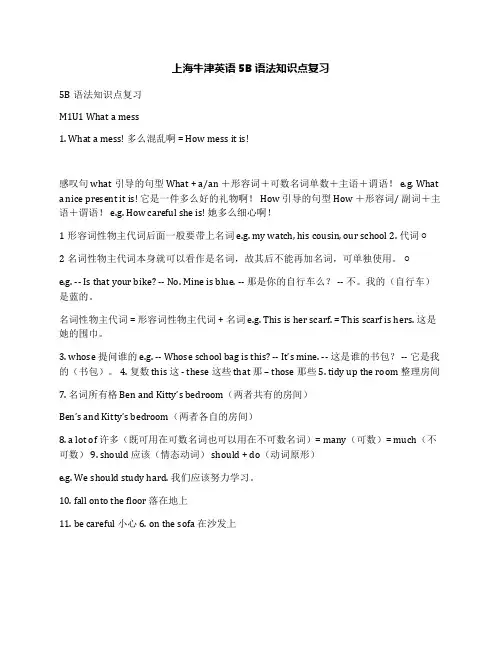
上海牛津英语5B语法知识点复习5B语法知识点复习M1U1 What a mess1. What a mess! 多么混乱啊 = How mess it is!感叹句 what引导的句型What + a/an +形容词+可数名词单数+主语+谓语! e.g. What a nice present it is! 它是一件多么好的礼物啊! How 引导的句型 How +形容词/ 副词+主语+谓语! e.g. How careful she is! 她多么细心啊!1形容词性物主代词后面一般要带上名词 e.g. my watch, his cousin, our school 2. 代词○2名词性物主代词本身就可以看作是名词,故其后不能再加名词,可单独使用。
○e.g. -- Is that your bike? -- No. Mine is blue. -- 那是你的自行车么? -- 不。
我的(自行车)是蓝的。
名词性物主代词 = 形容词性物主代词 + 名词 e.g. This is her scarf. = This scarf is hers. 这是她的围巾。
3. whose 提问谁的 e.g. -- Whose school bag is this? -- It’s mine. -- 这是谁的书包? -- 它是我的(书包)。
4. 复数 this 这 - these 这些 that 那– those 那些5. tidy up the room 整理房间7. 名词所有格Ben and Kitty’s bedroom(两者共有的房间)Ben’s and Kitty’s bedroom(两者各自的房间)8. a lot of 许多(既可用在可数名词也可以用在不可数名词)= many(可数)= much(不可数) 9. should 应该(情态动词) should + do(动词原形)e.g. We should study hard. 我们应该努力学习。
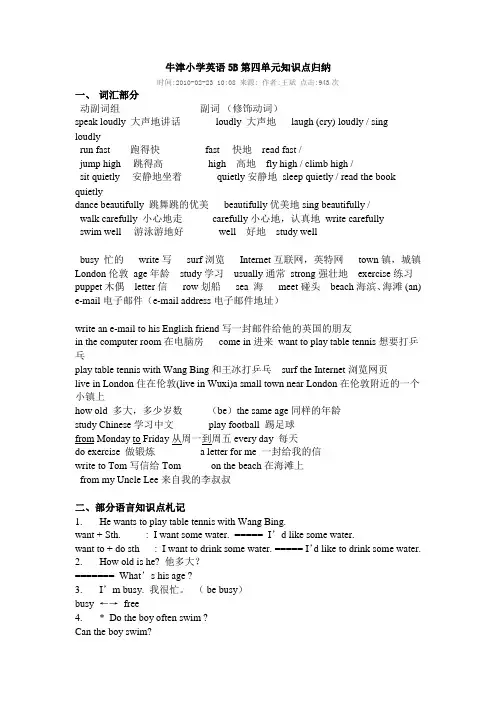
牛津小学英语5B第四单元知识点归纳时间:2010-02-23 10:08 来源: 作者:王斌点击:943次一、词汇部分动副词组副词(修饰动词)speak loudly 大声地讲话loudly 大声地 laugh (cry) loudly / singloudlyrun fast 跑得快 fast 快地 read fast /jump high 跳得高 high 高地 fly high / climb high /sit quietly 安静地坐着quietly 安静地 sleep quietly / read the book quietlydance beautifully 跳舞跳的优美beautifully 优美地 sing beautifully /walk carefully 小心地走 carefully 小心地,认真地 write carefullyswim well 游泳游地好well 好地 study wellbusy 忙的write 写surf 浏览Internet 互联网,英特网town 镇,城镇London 伦敦 age 年龄 study学习 usually 通常 strong 强壮地 exercise 练习puppet 木偶 letter 信 row 划船sea 海meet 碰头 beach 海滨、海滩 (an) e-mail 电子邮件(e-mail address电子邮件地址)write an e-mail to his English friend 写一封邮件给他的英国的朋友in the computer room 在电脑房 come in 进来 want to play table tennis 想要打乒乓play table tennis with Wang Bing 和王冰打乒乓 surf the Internet 浏览网页live in London 住在伦敦(live in Wuxi)a small town near London在伦敦附近的一个小镇上how old 多大,多少岁数(be)the same age 同样的年龄study Chinese 学习中文 play football 踢足球from Monday to Friday 从周一到周五 every day 每天do exercise 做锻炼 a letter for me 一封给我的信write to Tom 写信给Tom on the beach 在海滩上from my Uncle Lee 来自我的李叔叔二、部分语言知识点札记1.He wants to play table tennis with Wang Bing.want + Sth. : I want some water. ===== I’d like some water.want to + do sth : I want to drink some water. ===== I’d like to drink some water.2.How old is he? 他多大?======= What’s his age ?3.I’m busy. 我很忙。
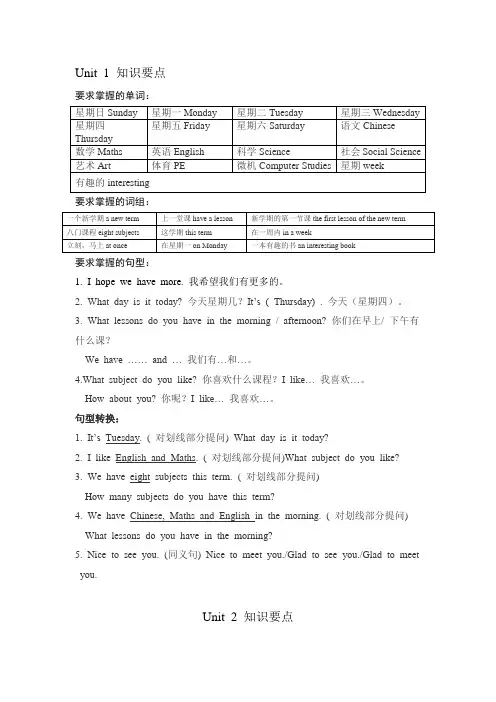
Unit 1 知识要点要求掌握的单词:要求掌握的词组:要求掌握的句型:1. I hope we have more. 我希望我们有更多的。
2. What day is it today? 今天星期几?It’s ( Thursday) . 今天(星期四)。
3. What lessons do you have in the morning / afternoon? 你们在早上/ 下午有什么课?We have …… and …我们有…和…。
4.What subject do you like? 你喜欢什么课程?I like…我喜欢…。
How about you? 你呢?I like…我喜欢…。
句型转换:1. It’s Tuesday. ( 对划线部分提问) What day is it today?2. I like English and Maths. ( 对划线部分提问)What subject do you like?3. We have eight subjects this term. ( 对划线部分提问)How many subjects do you have this term?4. We have Chinese, Maths and English in the morning. ( 对划线部分提问) What lessons do you have in the morning?5. Nice to see you. (同义句) Nice to meet you./Glad to see you./Glad to meet you.Unit 2 知识要点要求掌握的单词:要求掌握的词组:要求掌握的句型:1. Why are you absent today?你今天为什么缺席?(相当于Why are you not here today?)2. See you soon. 一会见。
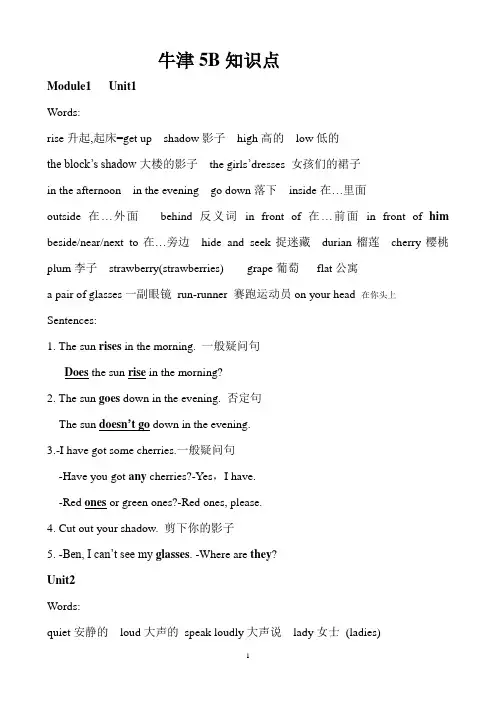
牛津5B知识点Module1 Unit1Words:rise升起,起床=get up shadow影子high高的low低的the block’s shadow大楼的影子the girls’dresses 女孩们的裙子in the afternoon in the evening go down落下inside在…里面outside在…外面behind 反义词in front of在…前面in front of him beside/near/next to在…旁边hide and seek捉迷藏durian榴莲cherry樱桃plum李子strawberry(strawberries) grape葡萄flat公寓a pair of glasses一副眼镜run-runner 赛跑运动员on your head 在你头上Sentences:1. The sun rises in the morning. 一般疑问句Does the sun rise in the morning?2. The sun goes down in the evening. 否定句The sun doesn’t go down in the evening.3.-I have got some cherries.一般疑问句-Have you got any cherries?-Yes,I have.-Red ones or green ones?-Red ones, please.4. Cut out your shadow. 剪下你的影子5. -Ben, I can’t see my glasses. -Where are they?Unit2Words:quiet安静的loud大声的speak loudly大声说lady女士(ladies)asleep睡着的awake醒着的hammer锤子screwdriver起子,螺丝刀both+名词复数both hammer s两把锤子music音乐-musical音乐的full满的an empty paper cup一个空纸杯musical instrument乐器shake摇动shaker摇杯bean豆tie系string绳circle圆形square方形round圆的be angry withtry 尝试over there在那边the girl on the bike自行车上的女孩Be careful!小心wheel 轮子Be quiet!安静too loud太吵了 a piece of paper一张纸be over 结束Sentences:1. Ben rides his bicycle to the shop. 改成现在进行时Ben is riding his bicycle to the shop.2. Ben, be quiet! Ben,保持安静3. Give me a hammer. 同义句Give a hammer to me. 给我一把锤子4. Do you want both bottles? -No, the empty one. 你想要两个瓶子吗?5.The two old ladies are asleep. 这两个老妇人是睡着的。
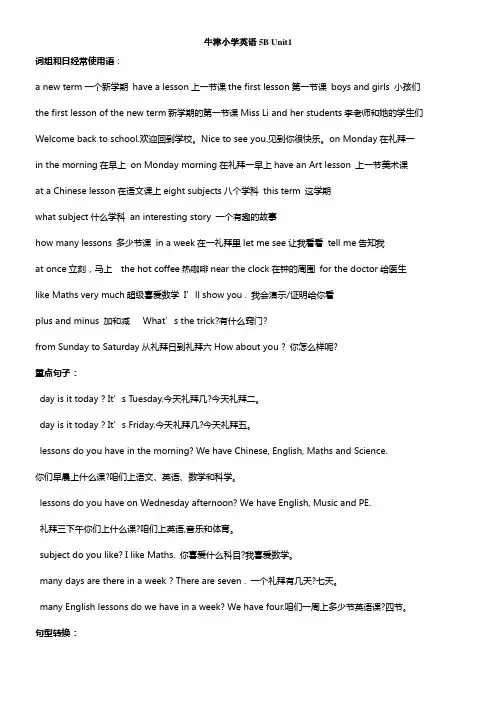
牛津小学英语5B Unit1词组和日经常使用语:a new term一个新学期have a lesson上一节课the first lesson第一节课boys and girls 小孩们the first lesson of the new term新学期的第一节课Miss Li and her students李老师和她的学生们Welcome back to school.欢迎回到学校。
Nice to see you.见到你很快乐。
on Monday在礼拜一in the morning在早上on Monday morning在礼拜一早上have an Art lesson 上一节美术课at a Chinese lesson在语文课上eight subjects八个学科this term 这学期what subject什么学科an interesting story 一个有趣的故事how many lessons 多少节课in a week在一礼拜里let me see让我看看tell me告知我at once立刻,马上the hot coffee热咖啡near the clock在钟的周围for the doctor给医生like Maths very much超级喜爱数学I’ll show you . 我会演示/证明给你看plus and minus 加和减What’s the trick?有什么窍门?from Sunday to Saturday从礼拜日到礼拜六How about you ? 你怎么样呢?重点句子:day is it today ? It’s Tuesday.今天礼拜几?今天礼拜二。
day is it to day ? It’s Friday.今天礼拜几?今天礼拜五。
lessons do you have in the morning? We have Chinese, English, Maths and Science.你们早晨上什么课?咱们上语文、英语、数学和科学。
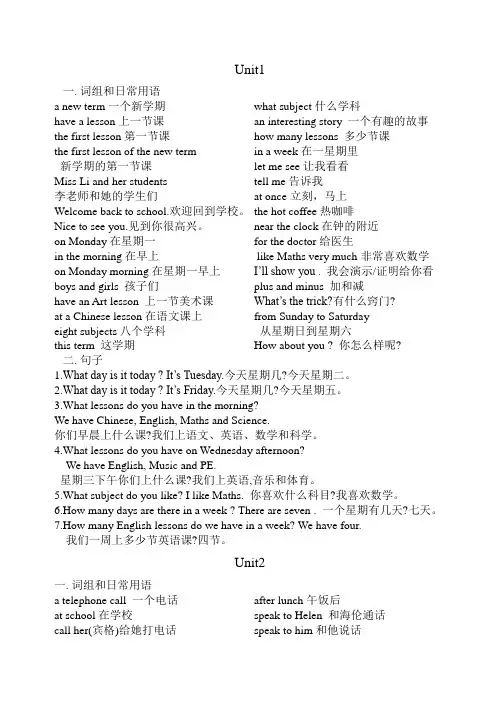
Unit1 一.词组和日常用语a new term一个新学期have a lesson上一节课the first lesson第一节课the first lesson of the new term新学期的第一节课Miss Li and her students李老师和她的学生们Welcome back to school.欢迎回到学校。
Nice to see you.见到你很高兴。
on Monday在星期一in the morning在早上on Monday morning在星期一早上boys and girls 孩子们have an Art lesson 上一节美术课at a Chinese lesson在语文课上eight subjects八个学科this term 这学期what subject什么学科an interesting story 一个有趣的故事how many lessons 多少节课in a week在一星期里let me see让我看看tell me告诉我at once立刻,马上the hot coffee热咖啡near the clock在钟的附近for the doctor给医生like Maths very much非常喜欢数学I’ll show you . 我会演示/证明给你看plus and minus 加和减What’s the trick?有什么窍门?from Sunday to Saturday从星期日到星期六How about you ? 你怎么样呢?二.句子1.What day is it today ? It’s Tuesday.今天星期几?今天星期二。
2.What day is it today ? It’s Friday.今天星期几?今天星期五。
3.What lessons do you have in the morning?We have Chinese, English, Maths and Science.你们早晨上什么课?我们上语文、英语、数学和科学。
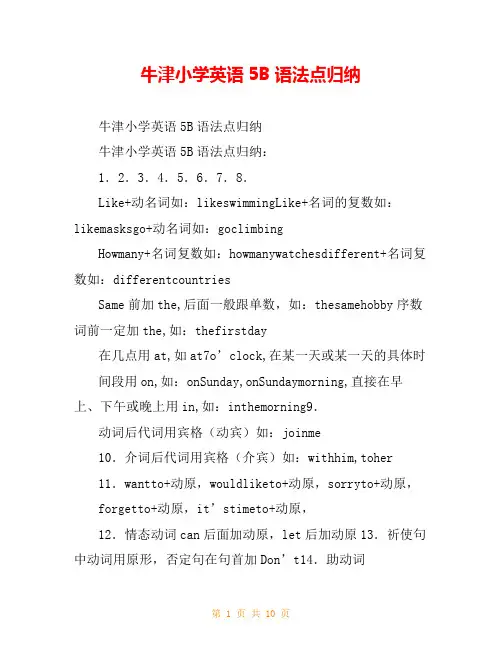
牛津小学英语5B语法点归纳牛津小学英语5B语法点归纳牛津小学英语5B语法点归纳:1.2.3.4.5.6.7.8.Like+动名词如:likeswimmingLike+名词的复数如:likemasksgo+动名词如:goclimbingHowmany+名词复数如:howmanywatchesdifferent+名词复数如:differentcountriesSame前加the,后面一般跟单数,如:thesamehobby序数词前一定加the,如:thefirstday在几点用at,如at7o’clock,在某一天或某一天的具体时间段用on,如:onSunday,onSundaymorning,直接在早上、下午或晚上用in,如:inthemorning9.动词后代词用宾格(动宾)如:joinme10.介词后代词用宾格(介宾)如:withhim,toher11.wantto+动原,wouldliketo+动原,sorryto+动原,forgetto+动原,it’stimeto+动原,12.情态动词can后面加动原,let后加动原13.祈使句中动词用原形,否定句在句首加Don’t14.助动词(dodoesdon’tdoesn’t)后动词用原形15.形容词加名词(形名)如:abeautifulgirl16.动词加副词(动副)如:dancebeautifully17.Some用于肯定句,any用于否定句18.Therebe结构就近原则如:Thereisateacherandsomestudentsintheclassroom.19.不可数名词:watercoffeeteamilkjuicebreadrice foodfruitpaperchocolateexercisefish20.乐器前加the,球类前不加the,(playthe乐器,play 球类)如:playthepiano,playfootball21.Who当作特殊的第三人称单数1.Listen,Jim__________(sing)anEnglishsonginthemusi croom.2.WangBing____________(like)(make)modelships.3.I__ _________(live)inNanJing,butmyfriend(live)inEngland.4.Myfather(like)(read)newspaper,butmymother(not)5.It’stwoo’clockintheafternoon.We_________(have) anEnglishclassnow.6.Ilike__________(sing),she_________(like)________ _(dance).7.WhatHelenoften(do)attheweekends?She often(catch)insects.8.He__________(donot)want(eat)breadforbreakfast.9. I_______(have)afriend.Hername______(be)Susan.She_____( like)singinganddancing10.__________YangLing(have)(some)hobbies?Yes,she.11.Where(be)HelenandTomfrom?They(be)from(American)?12.Sheusually__________(go)shoppingwithhermother.13.What’s(Nan cy)hobby?She(like)(grow)flowers.14.MrSmith__________(come)fromAustralia.Hespeaks(E ngland).15.Look,They__________(play)footballintheplayground.16.__________(do)yoursister(watch)TVeveryday?No,she.17.LiuTaocan(swim)(good).(he)mothercan(dance)(beautiful).18.Ioftengo__________(swim)onSu ndayafternoon.Butmymother(go)(shop)19.(Nancy)parents(be)from(Japanese).They’reJapane se(visit).20.Howmany(child)arethereinyourclass?There(be)thirty.21.Achicken(have)two(foot).22.I’dlike__________(b uy)some(peach)inthesupermarket.23.Let(we)(help)(she)with(she)homework.(good).24.We__________(want)(go)(fish).25.__________you__ ________(skate)now?No,I(write)ane-mailto(I)friend.26.There(be)somemilkinthebottle.27.There(be)some(butterfly)and(dragonfly)inthepark.28.What(be)(you)mother(do)now?She(cook)inthekitchen.29.Iwantto__________(buy)someinterestingbooksatthe bookshop30.There(be)some(knife)and(fork)inthecupboard.31.I(like)(ski).Ican(ski)32.LiuTaoandWangBingusually__________(run)afterschool.Look,they(run)intheplaygr ound.33.Thisis(she)book.Those(be)(they)(book).34.Today(be)(teacher)Day.These(card)arefor(they).35.Iwant__________(write)alettertomyf riend.Heis(Australia).36.(be)there(some)breadinthefridge?No,there.37.Todayisthe__________(one)dayofthenewterm.38.Thereany(student)intheclassroom.They(paly)volleyballnow.39.MumandI__________(have)(same)hobby.40.Shallwe__ ________(go)tothecinemabybike?Allright.41.________(do) yourfriends(visit)yourfamilyeveryweek?No,they__________(do).42.What_(be)oneplusfour?It’sfive.43.show(they)how(darw)firefly)44.Who(be)ondutytoday?附加题:Where(be)mygloves?They(be)therejustnow.Ican’tfind(it).扩展阅读:牛津小学英语5B 语法点归纳5B语法点归纳班级姓名知识点1.Like+动名词如:likeswimming2.Like+名词的复数如:likemasks3.go+动名词如:goclimbing4.Howmany+名词复数如:howmanywatches5.Different(不同)+名词复数如:differentcountries6.same前加the,后面一般跟单数,如:thesamehobby7.序数词前一定加限定词,如the,如:thefirstday8.在几点用at,如at7o’clock。
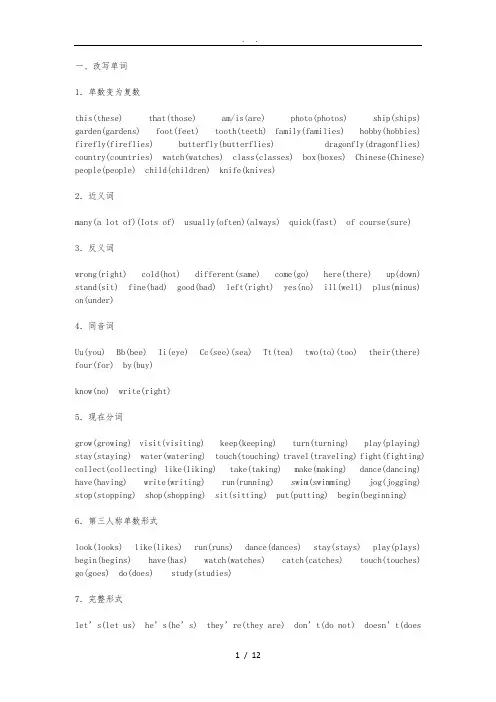
一、改写单词1.单数变为复数this(these) that(those) am/is(are) photo(photos) ship(ships) garden(gardens) foot(feet) tooth(teeth) family(families) hobby(hobbies) firefly(fireflies) butterfly(butterflies) dragonfly(dragonflies) country(countries) watch(watches) class(classes) box(boxes) Chinese(Chinese) people(people) child(children) knife(knives)2.近义词many(a lot of)(lots of) usually(often)(always) quick(fast) of course(sure)3.反义词wrong(right) cold(hot) different(same) come(go) here(there) up(down) stand(sit) fine(bad) good(bad) left(right) yes(no) ill(well) plus(minus) on(under)4.同音词Uu(you) Bb(bee) Ii(eye) Cc(see)(sea) Tt(tea) two(to)(too) their(there) four(for) by(buy)know(no) write(right)5.现在分词grow(growing) visit(visiting) keep(keeping) turn(turning) play(playing) stay(staying) water(watering) touch(touching) travel(traveling) fight(fighting) collect(collecting) like(liking) take(taking) make(making) dance(dancing) have(having) write(writing) run(running) swim(swimming) jog(jogging) stop(stopping) shop(shopping) sit(sitting) put(putting) begin(beginning)6.第三人称单数形式look(looks) like(likes) run(runs) dance(dances) stay(stays) play(plays) begin(begins) have(has) watch(watches) catch(catches) touch(touches) go(goes) do(does) study(studies)7.完整形式let’s(let us) he’s(he’s) they’re(they are) don’t(do not) doesn’t(doesnot) I’ve(I have) can’t(can not)8.名词所有格Ben(Ben’s)Mike(Mike’s) Su Yang(Su Yang’s) Helen(Helen’s)9.主格his(he) her(she) me(I) them(they) your(you) us(we)10.宾格she(her) he(him) I(me) you(you) they(them) we(us) it(it)二、改写句子1.对画线部分提问It’s half past ten. (What time is it?)The students are in the sprots hall. (Where are the students?)My uncle likes growing flowers. (What does your uncle like doing?)I feel better now. (How do you feel now?)I’ve got a high fever. (What’s wrong with you?)I come from Japan. (Where do you come from?)She is from China. (Where is she from?)The girl in red is my sister. (Which girl is your sister?)Tom comes from the USA.(Who comes from the USA?)2.改为一般疑问句I’m taking some medicine. (Are you taking any medicine?)She feels very tired. (Does she feel tired?)I want to fly a kite. (Do you want to fly a kite?)The boy is standing. (Is the boy standing?)He lives in a small town. (Does he live in a small town?)They can play the piano. (Can they play the piano?)3.改为否定句My mother is taking some medicine. (My mother isn’t taking any medicine.) She can mak e clothes. (She can’t make clothes.)He works from Monday to Friday. (He doesn’t work from Monday to Friday.) They’re buying food in the shop. (they aren’t buying food in the shop.) They play table tennis every day. (They don’t play table tennis every d ay.) That is Jan’s umbrella. (改为同义句)That umbrella is Jan’s.It’s time to have breakfast. (改为同义句)It’s time for breakfast./It’s time for having breakfast.Who is absent today? (改为同义句)Who is not here today?I’m going to the library now. (改为祈使句)Don’t go to the library now.The man puts the plate on his finger. (改为现在进行时)The man is putting the plate on his finger.They are our good friends. (改为单数形式)He is my good friend.They usually do housework on Sundays. (改为单数形式)He usually does housework on Sunday.三、连词成句think, is, today, Saturday, I (.) (I think today is Saturday.) you, can, me, tell (?) (Can you tell me?)I, to, go, China, hope, I, can (.) (I hope I can go to China.) this, subject, you, do, what, like, term (?)(What subject do you like this term?)lesson, it, the, new, the, of, term, is first (.)(It is the first lesson of the new term.)is, stamps, he, showing, to, friends, his, his (.)(He is showing his stamps to his friends.)she, does, making, like, ships, model (?)(Does she like making model ships?)with, what’s, you, wrong (?) (What’s wrong with you?)have, lessons, I, in, four, the, morning (.)(I have four lessons in the morning.)goes, from, he, Friday, to, Monday, school, to (.)(He goes to school from Monday to Friday.)subjects, study, what, he, at, does, school (?)(What subjects do you study at school?)hobby, stamps, is, Ben’s, collecting (.)(Ben’s hobby is collecting stamps.)you, in, what, do, lessons, the have, morning (?)(What lessons do you have in the morning?)you, why, absent, are, today (?) (Why are you absent today?) left, right, Ton, three, turn, times, and (.)(Turn left and right three times, Tom.)you, touch, your, your, head, can, with, hands(?)(Can you touch your head with your hands?)lie, do, on, not, your, back(.)(Do not lie on your back.) putting, the, is man, on, the, apple, finger, his (.)(The man is putting the apple on his finger.)are, the, lesson, students, where, having, a PE (?)(Where are the students having a PE lesson?)fingers, many, does, how, the, have, monkey (?)(How many fingers does the monkey have?)has, a, David, day, busy (.) (David has a busy day.)a, game, basketball, this, there, evening, is (.)(There is a basketball game this evening.)what, it, is, time, now, Ben(?) (What time is it now,Ben?) you, thirsty, feel, do (?) (Do you feel thirsty?)begins, English, at, to, fifteen, our, lesson, ten (.)(Our English lesson begins at fifteen to ten.)like, Mike, does, to, English, speak (?)(Does Mike like to speak English?)same, Tom, are, Jason, From, country, the and (.) (Tom and Jason are from the same country.)are, the, Miss, talking, Wang, students, to (.) (The students are talking to Miss Wang.)want, do, New York, you, go, to, around (?)(Do you want to go around New York?)teaches, he, in, school, English, a, primary (.) (He teaches English in a primary school.)it, today, what, is day(?) (What day is it today?) is, think, interesting, I, English (.)(I think English is very interesting.)us, meet, come, and, here(.)(Come here and meet us.) an, , he, writing, is, his, teacher, to (.)(He is writing an to his teacher.)四、中译英(一)词组1 在周一上午(on Monday morning)2读英语(read English)3上一节美术课(have an Art lesson)4一节有趣的课(an interesting lesson)5上更多的课(have more lesson)6每天(every day)7马上(at once)8午饭后(after lunch)9感到很热(feel hot)10重感冒(a bad cold)11.休息(have a rest)12看医生(see a doctor)13吃一些药(take some medicine)14感到好些了(feel better)15在周三(on Wednesday)16星期四下午(Thursday afternoon)17七门科目(seven subjects)18在一周(in a week)19对…说话(speak to…)20打给我(call me)21患了咳嗽(get a cough)22怎么了(what’s wrong)23在学校(at school)24呆在床上(stay in bed )25错误(wrong number )26拍照(take photos )27集邮(collect stamps)28一位老同学(an old classmate)29一艘轮船(a ship )30购物(go shopping)31种树(grow the trees)32听音乐(listen to music)33出示…给…(show to… )34看一看(have a look)35养金鱼(keep goldfish)36一封(an )37同龄(the same age)38在一个小镇上(in a small town)39一封给我姐姐的信(a letter to my sister) 40居住(live in)41小房子(a small house)42从…到…(from…to…)43安静地坐(sit quietly)44在我家附近(near my home)45做衣服(make clothes)46上学(go to school)47放学后(after school)48做运动(do sports)49一动物邮票(an animal stamp)50拍照(take photos)51养狗(keep dogs)52相同的爱好(the same hobby)53写歌曲(write music)54上网(surf the Internet)55足球踢得好(play football well)56快速地停(stop quickly )57在每周六(on every Saturday)58读报(read newspaper)59浇花(water flowers)60打乒乓球(play table tennis)61弹钢琴(play the piano)62照看(look after)63仔细听(listen carefully)64抬起你的右腿(lift up your right leg)65向左转十次(turn left ten times)66上下跳两次(jump up and down two times)67把他们移到教室(move them to the classroom) 68站成四排(stand in four lines)69发出命令(give orders)70把你的手放在一起(put your hands together) 71弯曲你的膝盖(bend your knees)72做一些早锻炼(do some morning exercise)73在他的背上(on his back)74在体育课上(at a PE lesson)75在体育馆里(in the sports hall)76碰你的手臂(touch your arm)77抬起(lift up)78仰躺(lie on one’s back)79做家庭作业(do one’s homework)80做家务(do housework)81刷牙(brush teeth)82洗脸(wash face)83在八点半(at half past eight)84值日(on duty )85十点三刻(a quarter to eleven)86让我们快点(let’s hurry)87忙碌的一天(a busy day)88十点十分(ten past ten)89没有时间休息(have no time for rest)90从早到晚(from morning to night)91吃一些面包(have somebread)92谈论他们的家庭(talk about their family)93当然(of course)94从书中学到很多(learn a lot from the book) 95搬运一只红色的盒子(carry a red box)96捉蚂蚁(catch ants)97去跑步(go running)98度周末(spend weekends)99团队合作(group work )100在夜间发光(glow at night)101英语俱乐部(the English club)102不同的国家(different countries)103喜欢旅游(live traveling )104一个美国男孩(an American boy)105说法语(speak French)106长城(the Great Wall)107园林(the gardens in Su Zhou)108与…交谈(talk to…)109三个中国男孩(three Chinese boys)110在日本(in Japan)111儿童俱乐部(the Children’s club)112一位忙碌的参观者(a busy visitor)113访问澳大利亚(visit Australia)114一只勇敢的蚂蚁(a brave ant)115一法国地图(a map of France)116去爬山(go climbing )117捉昆虫(catch insects)118游览中国(go around China)119试着…(try to… )120在周末(at the weekends)(二)句子1、小男孩正站在他父亲的肩膀上。
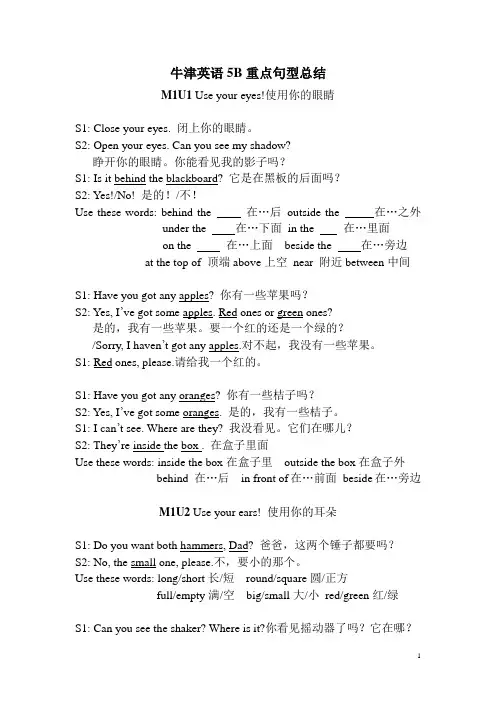
牛津英语5B重点句型总结M1U1 Use your eyes!使用你的眼睛S1: Close your eyes. 闭上你的眼睛。
S2: Open your eyes. Can you see my shadow?睁开你的眼睛。
你能看见我的影子吗?S1: Is it behind the blackboard? 它是在黑板的后面吗?S2: Yes!/No! 是的!/不!Use these words: behind the 在…后outside the 在…之外under the 在…下面in the 在…里面on the 在…上面beside the 在…旁边at the top of 顶端above上空near 附近between中间S1: Have you got any apples? 你有一些苹果吗?S2: Yes, I’ve got some apples. Red ones or green ones?是的,我有一些苹果。
要一个红的还是一个绿的?/Sorry, I haven’t got any apples.对不起,我没有一些苹果。
S1: Red ones, please.请给我一个红的。
S1: Have you got any oranges? 你有一些桔子吗?S2: Yes, I’ve got some oranges. 是的,我有一些桔子。
S1: I can’t see. Where are they? 我没看见。
它们在哪儿?S2: They’re inside the box . 在盒子里面Use these words: inside the box在盒子里outside the box在盒子外behind 在…后in front of在…前面beside在…旁边M1U2 Use your ears! 使用你的耳朵S1: Do you want both hammers, Dad? 爸爸,这两个锤子都要吗?S2: No, the small one, please.不,要小的那个。
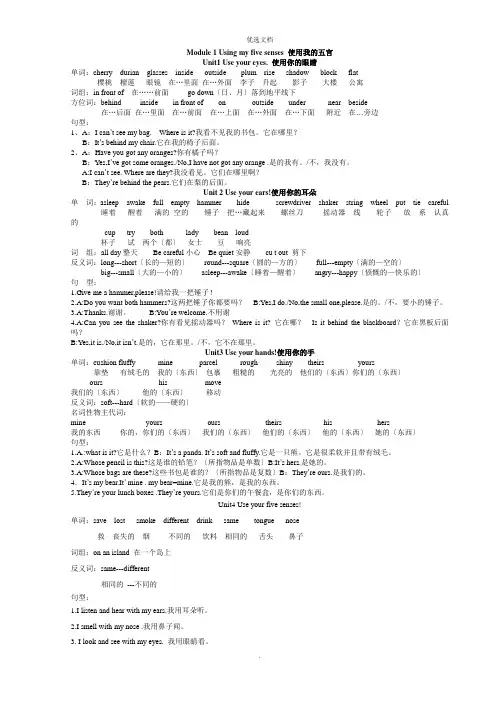
Module 1 Using my five senses 使用我的五官Unit1 Use your eyes. 使用你的眼睛单词:cherry durian glasses inside outside plum rise shadow block flat樱桃榴莲眼镜在…里面在…外面李子升起影子大楼公寓词组:in front of 在……前面go down〔日、月〕落到地平线下方位词:behind inside in front of on outside under near beside在…后面在…里面在…前面在…上面在…外面在…下面附近在…旁边句型:1、A:I can’t see my bag. Where is it?我看不见我的书包。
它在哪里?B:It’s behind my chair.它在我的椅子后面。
2、A:Have you got any oranges?你有橘子吗?B:Yes,I’ve got some oranges./No,I have not got any orange .是的我有。
/不,我没有。
A:I can’t see. Where are they?我没看见。
它们在哪里啊?B:They’re behind the pears.它们在梨的后面。
Unit 2 Use your ears!使用你的耳朵单词:asleep awake full empty hammer hide screwdriver shaker string wheel put tie careful 睡着醒着满的空的锤子把…藏起来螺丝刀摇动器线轮子放系认真的cup try both lady bean loud杯子试两个〔都〕女士豆响亮词组:all day整天Be careful小心Be quiet安静cu t out 剪下反义词:long---short〔长的—短的〕round---square〔圆的—方的〕full---empty〔满的—空的〕big---small〔大的—小的〕asleep---awake〔睡着—醒着〕angry---happy〔愤慨的—快乐的〕句型:1.Give me a hammer,please!请给我一把锤子!2.A:Do you want both hammers?这两把锤子你都要吗?B:Yes,I do./No,the small one,please.是的。
牛津英语5B知识点总结Unit 1 A new term一、词汇:A.单词:1.week星期 Monday、Tuesday、Wednesday、Thursday、Friday、Saturday、Sunday2.subject学科 Chinese、English、Computer Studies、PE,Art、Maths,Music 、Science科学、Social Science社会minus减去,well哎呀,tell告诉,trick窍门,interesting 有趣的B.词组:1.have a lesson上课2. have a/an … lesson上一节…课3. nice to see you见到你真高兴4.in a week在一星期里5. on Monday morning/afternoon/evening 在周一上午/下午/晚上6. let me see让我看看/想想7.two weeks两星期8.every day/week/Monday每天/每星期/每周一9. this week/term这个星期/这个学期10.in the morning/afternoon/evening在上午/下午/晚上11.welcome to our school/class欢迎来我们学校/班级12.welcome back to school/class欢迎回到学校/班级13.the first lesson of the new term新学期的第一节课14.at once立刻 15.how about 怎么样16.tell me/us/you/him/her/them告诉我/我们/你/他/她/他们17.an interesting …一个有趣的…二、句子:1.---- What day is it today? ----It’s …2.----What lessons do you/they have (in the …)?----I/We/They have … and …3.----What lessons does he/she have (in the …)?----He/She has …and…4.----What subject do you/they like? ----I/We/They like…----What subject does he/she like? ----He/She likes ….5.----What subjects do you/they study at school? ----I/We/They study …6.----What subjects does he/she study at school? ----He/She studies …7.We have eight subjects this term.Wha t are they?They are …这学期我们有八门学科。
Unit 1单元知识班级______________________ 姓名_______________________短语1. at the prince’s house 在王子家2. cannot go 不能去3. help me 帮助我4. my gloves 我的手套5. so sad 如此悲伤6. go to the party 去参加晚会7. have a good time 玩得很开心8. at the party 在晚会上9. have to go 不得不去10. visit every house 拜访每一户人家11. many girls 许多女孩12. try on 试穿13. try it on 试穿它14. have a drink 喝饮料15. leave a shoe behind 留下一只鞋16. in the forest 在森林里17. have some snacks 吃一些零食18. find some mushrooms 找到一些蘑菇19. hurry up 快一点20. be bad for…对……有害21. fit well 非常合适22. the Monkey King and Nezha 美猴王和哪吒23. have some nice clothes and shoes 有一些漂亮的衣服和鞋子24. put on the new clothes and shoes 穿上新的衣服和鞋子25. come back before 12 o’clock 在12点之前回来26. like reading fairy tales 喜欢读童话故事27. pick a big red mushroom 捡了一个大的红色的蘑菇句型1. There is a party at the prince’s house. 在王子家有一场晚会。
2. Cinderella, come and help me! 灰姑娘,过来帮我!3. Why are you so sad, dear? 亲爱的,为什么如此难过?4. Because I can’t go to the party. 因为我不能参加晚会。
牛津英语5B Module one语法总结一时态一般现在时1一般现在时的时间状语:always总是,often经常,usually通常,sometimes有时,never绝不,every day每一天,on Sundays每个周日。
2一般现在时的动词形式:1)be动词:am is are2)动词的形式:动词原形动词的单三形式3)注意:在一般现在时下,有be无动,有动无be.,即be 动词与行为动词不能同时出现。
3一般现在时的否定形式1)有be 动词的直接在be动词有加not2)没有be 动词的借助于助动词do/does(单三),在助动词后加not,且动词打回原形。
3)Have的否定形式A当have表示拥有什么东西的时候,否定形式可以采用以下三种形式:一have+not I have not enough food to eat.二do not+have I do not have not enough food to eat.三have+no+名词I have no enough food to eat.B当have为助动词时,否定形式采用have+notI have not been in Shanghai.C当have既不表示拥有,也不是助动词时,如have breakfast,否定形式采用do not+have I did not have breakfast last morning.4一般现在时的一般疑问句形式1)有be 动词的把be 动词提前。
2)没有be 动词的借助助动词do/does,将助动词提前,且动词打回原形5一般现在时的特殊疑问句形式特殊疑问词+一般疑问句二方位1in front of 在前面(不在其中)The tree is in front of the classroom. in the front of在前部(在其中)The blackboard is in the front of the classroom.2方位介词On在上面(接触物体)above 在。
牛津英语5B知识点总结Unit 1 A new term一、词汇:A.单词:1.week星期 Monday、Tuesday、Wednesday、Thursday、Friday、Saturday、Sunday2.subject学科 Chinese、English、Computer Studies、PE,Art、Maths,Music 、Science科学、Social Science社会3、minus减去,tell告诉, ,interesting 有趣的B.词组:1.have a lesson上课2. have a/an … lesson上一节…课3. nice to see you见到你真高兴4.in a week在一星期里5. on Monday morning/afternoon/evening 在周一上午/下午/晚上6. let me see让我看看/想想7.two weeks两星期8.every day/week/Monday每天/每星期/每周一9. this week/term这个星期/这个学期10.in the morning/afternoon/evening在上午/下午/晚上12.welcome back to school/class欢迎回到学校/班级13.the first lesson of the new term新学期的第一节课14.at once立刻 15.how about 怎么样16.tell me/us/you/him/her/them告诉我/我们/你/他/她/他们17.an interesting …一个有趣的…二、句子:1.---- What day is it today? ----It’s …2.----What lessons do you/they have (in the …)?----I/We/They have … and …3.----What lessons does he/she have (in the …)?----He/She has …and…4.----What subject do you/they like? ----I/We/They like…----What subject does he/she like? ----He/She likes ….5.----What subjects do you/they study at school? ----I/We/They study …6.----What subjects does he/she study at school? ----He/She studies …7.We have eight subjects this term.What are they?They are …这学期我们有八门学科。
8.How many …(s) do you/we have in a week? I/We have …你/我们一周有几节课?How many …(s) does he/she have in a week? He/She has…10.What’s …plus/minus … ?It’s…11.I’ll show you. I can tell you at once.我来教你。
我能马上告诉你。
12.Can you tell me at once?你能马上告诉我吗?13.What’s the trick?窍门是什么?Unit 2 A telephone call一、词汇:A.单词:her(宾格)她,a cough,a fever,a cold感冒,speak,bad,get,feel,a headache,fine健康a toothache牙痛,an earache耳痛,a backache背痛,a stomach ache胃痛,why为什么,absent缺席,hear听见,hope希望,better好些,B.词组:1.at school/home在学校/在家2.call me/you/him/her/us/them/Miss Li打电话给我/你/他/她/我们/他们/李老师3.after lunch/school/class午饭后/放学后/课后4.have lunch/(breakfast/supper)吃午饭/(早饭/晚饭)5. stay in bed呆在床上6. a bad cough咳嗽得很厉害7. speak to …和…说话 (speak English/Chinese说英语/说中文)8.get a bad cold 得了重感冒 9. feel cold觉得冷10.go to see the doctor去看病(去看医生)11.take some medicine服药 12. you’re absent你缺席了13.get better soon很快好起来 14.see you soon一会儿见15.(still) feel ill/better/hot/cold/tired/hungry/thirsty(仍然)觉得病的/好点了/热/冷/累/饿/渴16.classes are over下课了 17.open your mouth张开嘴18.get some fruit for you拿些水果给你 19.wrong number错误的号码20.have a lot of rest多多休息 21. .a high fever高烧22.anything else还有其他的什么二、句子:1.----How do you feel now? ----I feel … (How does he/she feel now?)2.I can get a/some … for you. (He/She feels …)3.----What’s w rong with you?----I’ve got …(with me/him/her/us/them)----I’m sorry to hear that.4.----May I speak to …?----This is …(speaking).5.----Why are you absent today?今天你为什么缺席?---I’m ill.6.I hope you get better soon.我希望你很快还起来。
7.----Are you taking any medicine?-你在吃药吗?---Yes,a lot.9.Sorry,wrong number.对不起,打错了。
Unit 3 Hobbies一、词汇:A.单词:hobby(hobbies),collect,a stamp, a classmate同班同学,a ship, many许多,every每一,aunt阿姨,uncle叔叔,Chinese中国的,beautiful 美丽的,animal动物,grow种植,water浇水,same(通常与the连用)同样的B.词组:1.take photos拍照2.go shopping购物3.collect Chinese stamps收集中国邮票4.make clothes 做衣服5.collect newspapers收集报纸6.make model ships/planes/cars造模型船/飞机/汽车7.grow flowers/trees种花/树 8.the same hobby相同的爱好9.s how us …,please请给我们看看… 10.like cooking喜欢下厨11.show them to his classmates把它们给他的同学看12.here they are它们就在这儿 13.cook nice food烧好吃的食物14.my/your/her/his uncle我的/你的/她的/他的叔叔15.many stamps许多邮票16.make pretty dresses for my doll给我的洋娃娃做漂亮的裙子17.make a T-shirt for my dog给我的狗做一件T恤衫18.water the trees and flowers给树和花浇水e here and have a look来这儿看一看20.grow beautiful flowers种漂亮的花 21.animal stamps动物邮票22.many beautiful …(s)许多漂亮的…二、句子:1.----Do you have any hobbies?----Yes,I do.I like …(ing)He/She likes …(ing),too.----Does he/she have any hobbies?----Yes,he/she does.He/She likes ...(ing)2.…hobby is …(ing)…hobbies are …(ing)3.I like this ship stamp.4.She cooks nice food and grows beautiful flowers.她能做好吃的饭菜和种美丽的花。
5.I can make …for …Can you make …for …?Sure6.Where are you?I’m in the garden.7.Do you … every day?你每天吗?Sometimes I do.sometimes I don’t.8..We have the same hobby. 我们有相同的爱好。
9.Does your uncle have the same hobby?Yes,he does.你叔叔有同样的爱好吗?Unit 4 An English friend一、词汇:A.单词:an e-mail,English英国的,busy,a town,usually通常,well好,fast,high,does,does not=doesn’t,can,can not=can’t,from从,来自surf浏览,Internet英特网,London伦敦,loudly大声地,beautifully美地,carefully小心地,quietly安静地,B.词组:1.write an e-mail to …给…写一封电子邮件2.an English friend/a Chinese friend一位英国/中国朋友3.live in a small town/house居住在一个小镇/小房子4.his /my English friend他的/我的英国朋友5.a busy day 忙碌的一天6.swim/play/dance/draw/… well游得/玩得/跳舞/画得好7.run fast跑得快 8.jump high跳得高9.from Monday to Friday从星期一到星期五10.in the computer room在电脑房里 11.study chinese学习语文12.walk/write carefully小心地走/写 13.sit quietly安静地坐14.speak loudly大声地说 15.want to … with …想和…一起…16.surf the Internet上网 17.live in London住在伦敦18. dance beautifully跳舞跳得漂亮 19.a letter for me 一封给我的信20.from my Uncle Lee我的李叔叔写来的信21.like Art very much非常喜欢艺术二、句子:1.----D oes …动词用原形?----Yes,… does./No,…doesn’t.Does he live in London?No,he doesn’t.He lives in…2.----What does …usually do …? ---H e/She usually …动词用第三人称单数形式What do you/they/Jim and Mike usually do ..?3.I’m/He’s/She’s/We’re/They’re busy.4.----What subjects does he study at school?他在学校学习什么学科?---He studies …5.I go to school from Monday to Friday.我从周一到周五上学。